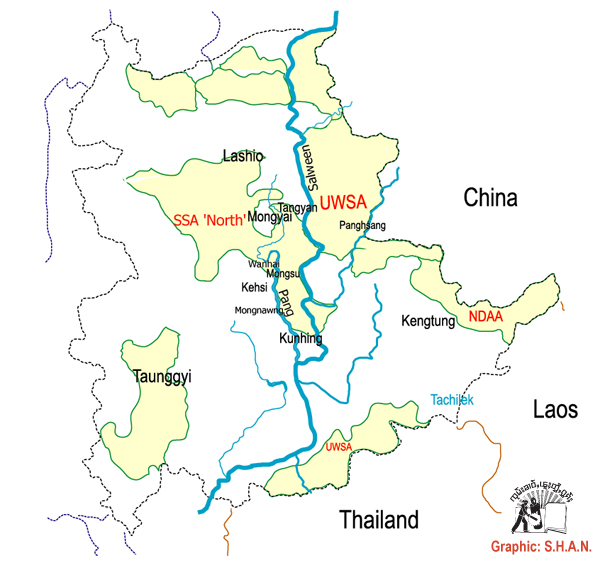Having suffered at least 300 casualties and the offensive drawing out from planned one week to two months, the Burma Army is using more and more local People’s Militias against the Shan State Progress Party / Shan State Army (SSPP / SSA), better known as the SSA North, according to both local and rebel sources.
On 10 May, Col Khaing Zaw, area commander of Tangyan township, summoned all militias to mobilize all their troops and weapons available. “They were to leave only skeleton troops to guard their rear bases,” said an informed source.
Among them are 100 plus strong Mong Ha militia led by Ma Guowen and 400 plus strong Manpang militia led by Bo Mon, both of whom are ex-officers from the defunct Mong Tai Army (MTA) of the late Khun Sa.

“We don’t want to fight them,” said an SSA commander. “This is what we call using carp oil to fry carp fish. But sometimes the fight is unavoidable.”
He asked SHAN to allow more articles focusing on “the futility of people of Shan State fighting among themselves for the benefit of outsiders.”
According to a top-secret document leaked in February 2009, there are 396 militias with core strength numbering 8,365 and reserve strength of up to 16,320 in Shan State North.
“We had to agree to set up a militia force in our village,” one Shan militia leader in Shan State East recently told SHAN. “If we didn’t, then we would be accused as rebel sympathizers and there would be more abuses against the villagers.”
According to the SSA North, 3,500 strong Burma Army units were deployed against their 2,500-3,000 strong fighters. “Our casualties were minimal,” the officer said without giving a figure, “because we move in small teams and concentrate our troops only when we have to.”
The present SSA North is a breakaway from the former SSA North, two of whose brigades, 3rd and 7th, had agreed to become Burma Army-run militias last year. The present SSA North is the offshoot of the former 1st Brigade and fighters from the erstwhile 3rd and 7th Brigades combined. It, together with its allies: Kachin Independence Army (KIA), United Wa State Army (UWSA) and National Democratic Alliance Army (NDAA), has refused to accept Naypyitaw’s “one country, one military” program unless its call for increased local autonomy is answered.



